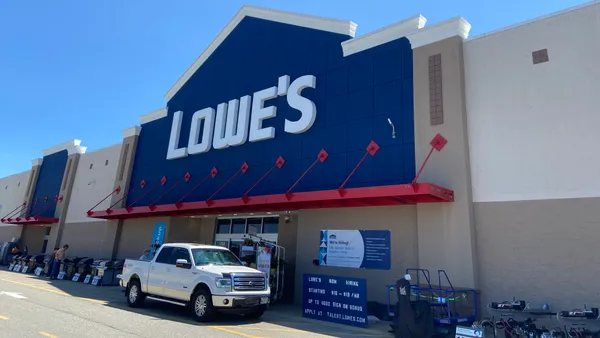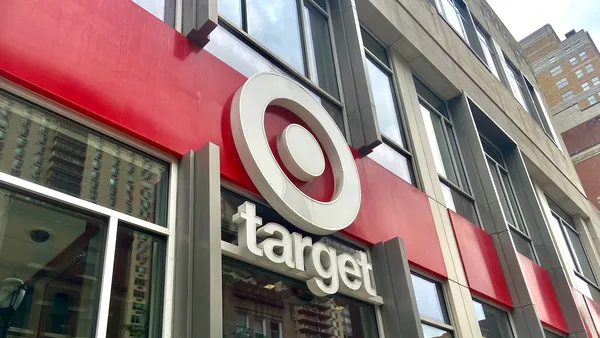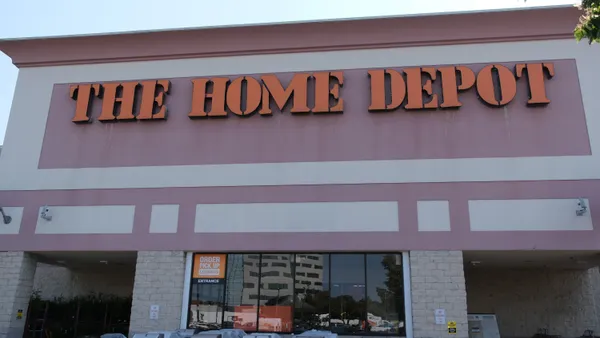Dive Brief:
-
RH, formerly known as Restoration Hardware, reported Monday that third-quarter net revenue rose 7% year over year; adjusted net revenues rose 8% to $638.5 million and adjusted net revenues rose 10%, which was adjusted further for last year's Q3 inventory reduction efforts, according to a company press release.
-
Comparable brand revenues rose 4% in the quarter on top of a 6% increase last year, and, adjusted for last year's inventory reduction efforts, they rose 6.5%, the company also said. Adjusted net income for the quarter rose 92% to $46.8 million, and GAAP net income rose 70% to $22.4 million, the company said. "Our comps and overall business strengthened over the course of the quarter," CEO Gary Friedman told analysts Monday.
-
RH raised its fourth quarter and full-year targets for the fourth time, saying it now expects Q4 revenue to reach $680 million to $690 million (up from $665 million to $685 million). For fiscal 2018, the company expects revenue of $2.52 billion to $2.53 billion (up from $2.49 billion to $2.52 billion), and net income of $219 million to $223 million, a 64% increase at the midpoint last year's guidance for $125 million to $145 million. Longer term, the company expects FY 2019 net revenues to rise 8% to 12% to $2.72 billion to $2.82 billion, adjusted operating margins of 13% to 14% and adjusted net income of $250 million to $290 million.
Dive Insight:
RH is bracing for a housing market slowdown, but Friedman on a conference call with analysts expressed solid confidence in the retailer's emerging place in the upscale furniture market. The quarter's results "reflect strong full price selling, higher outlet margins, and continued cost benefits from our new operating platform," the company said in its release.
"Despite the fact that we're in a slowing market, despite the fact that we have tariff headwinds and so on, we like the path we're on," Friedman said on the call. "We're evolving from a business focusing on products to projects. ... Two years ago we had a long term plan [and had] $400 million more inventory than we're going to have in 2019."
The company's resilience in the face of macro pressures is found in its pivot to a more design services-oriented, hospitality-laced strategy, catering to luxury customers rather than merely pushing furniture, according to Friedman. The company's pivot to a membership model, which had been met with skepticism from many analysts, was a plan seven years ago that got delayed when the company's private equity owners took it public. "We're playing a different game, right? This is not a quarter-to-quarter game for us, it's a long-term game," he said.
Tariffs did take a bite in the quarter. Both comparable brand and net revenues were negatively impacted by about one point because of slower special order receipts from China due to tariff related shipping congestion, the company said in its release, saying that it expects the delayed receipts to have a positive impact on fourth quarter revenues.
But Friedman shrugged off tariffs, saying that the company has factored in a spike as high as 25% and noting that rivals will face the same increases. Tariffs on $200 billion worth of goods from China will remain at the rate of 10% and not rise to 25% on Jan. 1, 2019, The White House announced after a meeting between Donald Trump and Chinese President Xi Jinping at the G-20 summit last weekend, but uncertainty remains and many expect tariffs to be levied, possibly at the highest level Trump has proposed.
Even if tariffs are imposed at that rate, sourcing from China is cheaper than shifting manufacturing to the U.S., Friedman said. And not even that worst-case scenario would make RH shift away beyond what he called "natural evolution" to other locales. He called doing otherwise "a mistake."
"China is the biggest, most sophisticated manufacturing country in the world — there's no one close," he said. "You can't shift to all this business … to these little small countries … without massive dislocation risk. I'd rather make sure I got high quality goods delivered on time than try to save a few bucks and have a dislocation in my supply chain."












